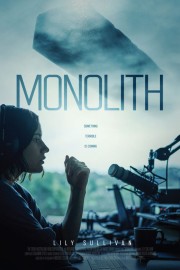Monolith
“Monolith” takes place- largely- within an isolated space. It follows a journalist whom, after she was disgraced when she failed to check her sources properly, has a podcast that follows strange phenomena. One day, she gets an anonymous tip that quickly leads her down a rabbit hole of conspiracy and uncertainty. All of the sudden, her podcast explodes, but the further she goes, the more unstable she gets. I love that the main character (played by Lily Sullivan) is only seen in her home; as someone who has become fascinated by what leads people to believe in conspiracy theories over the years, it’s a great representation of the isolation that comes to people who head down that path.
The direction and writing are of the utmost importance to a film like “Monolith,” as its minimal cast and setting require us to be drawn in by the character, their situation and how they express themselves. In that regard, screenwriter Lucy Campbell and director Matt Vesely succeed quite well. The main character- known only as The Interviewer- is a fascinating one, a woman whom is passionate about what she covers, but also skeptical if it feels like it’s too out there to be believed. So why does she believe the stories she’s being told about mysterious black bricks people come in contact with? Because her interview subjects sound shaken by them. That’s where the writing is important. The direction comes in how Vesely uses close-ups and insert shots of the podcast being created, and the character’s “big wall of conspiracy” being formed, to get us into their mindset as the podcast grows, as does the story she is learning.
The minimal settings and actors involved with “Monolith” sometimes point to a film that was made inexpensively, and couldn’t afford to have more resources put towards it. That might be true, but honestly, this is the best way to tell this story. And while there’s not a lot of depth to the film, we get a strong sense of what it is for people to get lost in a conspiracy, and be faced with a side of them they never expected to be in touch with, or realize they had in them. The third act of this film- which flies by at a brisk 94 minutes- puts that idea in front of us in a way that is not unfamiliar in the psychological sci-fi/horror thriller genre, but makes a lot of sense. I don’t know if it quite sticks the landing, but I was immensely entertained by the film in general.










